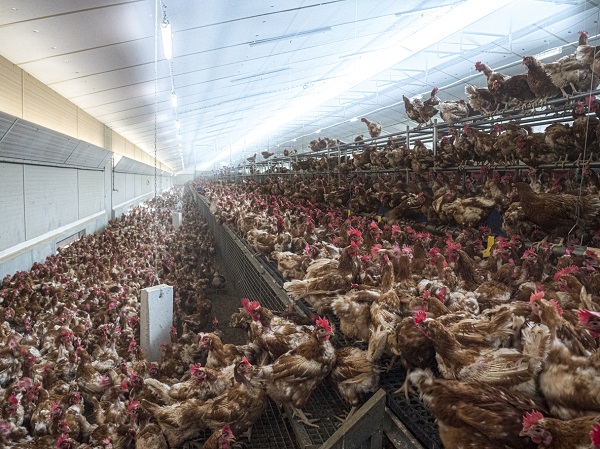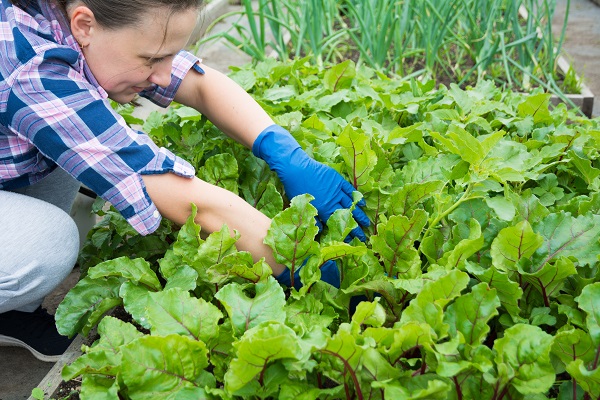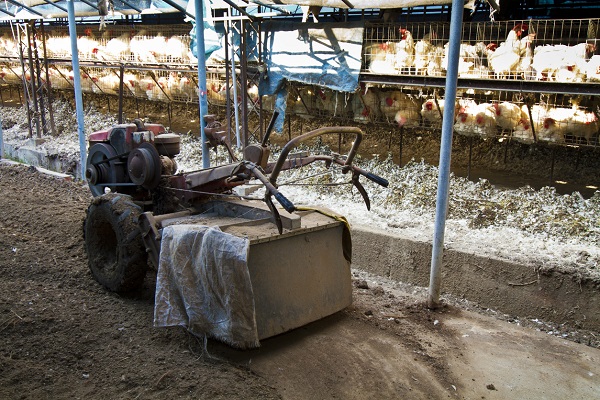People have been using chicken manure as a fertilizer and soil amendment for thousands of years. When humans developed sedentary agriculture, they quickly encountered the reality that growing crops in the same soil year after year will drain the soil of its nutrients. If you do nothing to replenish these nutrients, your crops will perform poorly, or even fail to grow. Manure from livestock proved to be an effective and accessible fertilizer thousands of years ago, and this is still largely true today.

However, there are noticeable differences between using manure left behind by livestock you personally own versus the manure bundled and sold by factory farms to industrial manufacturers for pennies on the pound. Chicken manure, which is commonly regarded as an excellent source of fertilizer, can be harmful to humans, soil, and plant health when improperly used.
A commonly known detriment of using chicken manure is its high nitrogen content. Over time, this nitrogen is broken down by bacteria and converted into ammonia. In large quantities, ammonia will cause chemical burns on both plants and humans, and in smaller quantities it releases a pungent smell. If chicken manure is spread before heavy rainfall, water runoff can lead to algae blooms and environmental damage due to excessive nitrogen levels.
Still, the issue of ammonia in chicken manure is well known and can be managed with proper planning. The next issues concerning chicken manure are much more difficult to solve. First, let’s take a quick step back. Googling “chicken manure fertilizer” will likely return a variety of articles that are generally positive about its use in home gardens. These articles will usually dedicate a small section to the negative effects of chicken manure, but beyond this, chicken manure receives positive press as an organic fertilizer. And when chicken manure is handled properly, it is a good fertilizer. Unfortunately, mass-market chicken manure is often not mixed properly. To use chicken manure safely, it must be properly composted. Washington State University suggests composting chicken excrement and coop bedding with a one-part carbon (coop bedding) to 2 parts nitrogen (chicken manure) ratio. Allow 120 days after applying composted manure to the garden before consuming high-risk fruits and vegetables, such as root and leaf crops. Wait 90 days before consuming all other crops.
If you’re sourcing your own chicken manure and then composting it yourself, great! But the chicken manure used in the mass-market fertilizer brands you find at your local garden store is not composted. To save labor, time, and cost, chicken manure is heat dried. Heat-drying manure causes it to dry faster than natural composting, but it also leaves the manure more susceptible to shedding fine dust and particles when applied to a garden. These particles adhere themselves to plants, especially root crops, leafy vegetables, and low-hanging fruits. Eating these crops can cause you to become violently ill. However, chicken manure that is hastily heat-dried can also cause illness through direct contact with your body. Extremely fine particles of the heat-dried manure are constantly flaking off during application. These particles are breathed in, get stuck under fingernails, pass through skin pores, and can cause infection in open wounds, such as a paper cut. We’d like to call special attention to the effect that chicken manure fertilizer can have on family pets, specifically dogs. Since dogs are lower to the ground than humans and rely heavily on their sense of smell to get around, if a dog gets near freshly applied chicken manure, serious illness can follow.
We’ve compiled a glossary of potential pathogens found in chicken manure at the end of this article for those curious about the specific types of diseases. Be aware that these diseases can all be found in not all but most “organic” manure fertilizers. The risk of illness is further increased when you consider the conditions of factory chicken farms. Chickens are kept in tight spaces and packed together. Antibiotics are given to the chickens to prevent them from becoming sick in overcrowded conditions, and these antibiotics can be passed into manure. Once the chickens are slaughtered, the coop is swept for its manure. However, much more than manure is collected for use in fertilizer. Urine, feathers, old feed, various types of bedding, and miscellaneous trash can all be mixed with the manure. Any of these elements can introduce unknown pathogens that can harm you or your plants, and none of these items prevent the fertilizer from being labeled as “organic” when it’s on the store shelf. Buyer beware and make sure you read the label before you purchase any organic fertilizer!

Special significance should be given to bird flu, also known as avian flu, due to its significance in causing a substantial spike in egg prices in the USA in early 2023. Though it is highly unlikely for bird flu to infect humans, with only one confirmed case being reported in the latest outbreak, the flu can spread through manure. United States Department of Agriculture (USDA) regulations hyperfocus on managing the meat and eggs produced by chickens during a bird flu epidemic. Because of this manure management is often neglected. Though the heat-drying process used to create fertilizer is usually sufficient to kill off avian flu, the virus has a history of mutation and very little biosecurity happens beyond heat-drying.
The potential health risks of using mass market chicken manure as a fertilizer are too severe for use in a home garden. Just because chicken manure can be classified as an organic fertilizer under USDA guidelines does not mean that it is safe to use or beneficial to the environment. Instead, look for fertilizer brands that do not have chicken manure, dried poultry waste, or DPW in their ingredients. You won’t miss out on crop performance, but you will miss out on encountering a potentially deadly illness.
Glossary of Common Chicken Manure Pathogens & Accompanying Diseases
Escherichia coli (E. coli)
Escherichia coli (E. coli) live in the intestines of chickens. Although this group of

bacteria normally help to maintain a healthy intestinal tract; E. coli becomes pathogenic when passed in chicken manure. Some types of E. coli produce a toxin called Shiga toxin. These Shiga-toxin producing E. coli, also known as STEC, cause disease.
Symptoms of an E. coli infection are diarrhea, stomach cramps and vomiting. Fever and
blood in the stool may also be present. Symptoms generally appear within one to 10 days.
after becoming infected with the bacteria. Most people recover from an E. coli infection within a week, but severe E. coli infections can be life threatening and cause death.
Salmonella Bacteria
Salmonella infection (salmonellosis) is a common bacterial disease that affects the intestinal tract. Salmonella bacteria typically live in chicken intestines and are shed through stool (manure). Humans become infected most frequently through contaminated food, but chicken manure creates an easy source for infection. In some cases, diarrhea can cause severe dehydration and requires prompt medical attention. Life-threatening complications also may develop if the infection spreads beyond the intestines.
Histoplasmosis
Histoplasmosis is an infection caused by a fungus called Histoplasma. The fungus lives in
the environment, particularly in soil that contains large amounts of bird manure. Histoplasmosis is an infection caused by breathing in spores of the Histoplasma fungus often found in chicken manure. People usually get it from breathing in these spores when they become airborne.
Soil contaminated by chicken manure can spread histoplasmosis, putting gardeners and landscapers at the highest risk of the disease. Severe infections can be life-threatening. When signs and symptoms occur, they usually appear 3 to 17 days after exposure and can include fever, chills, headache, muscle aches, dry cough, chest pain and tiredness. Some people with histoplasmosis also get joint pain and rashes. People who have a lung disease, such as emphysema, can develop chronic histoplasmosis.
Signs of chronic histoplasmosis can include weight loss and a bloody cough. Chronic Histoplasmosis symptoms sometimes mimic those of tuberculosis. It can affect nearly any part of your body, including your mouth, liver, central nervous system, skin, and adrenal glands. If untreated, disseminated histoplasmosis is usually fatal.
Complications resulting from histoplasmosis can include:
Acute Respiratory Distress Syndrome
Histoplasmosis can damage lungs to the point that the air sacs begin filling with fluid. This prevents good air exchange and can deplete the oxygen in your blood
Heart Problems
Inflammation of the sac that surrounds your heart (pericardium) is called pericarditis. When the fluid in this sac increases, it can interfere with the heart’s ability to pump blood.
Adrenal Insufficiency
Histoplasmosis can harm your adrenal glands, which produce hormones that give instructions to virtually every organ and tissue in your body.
Meningitis
In some cases, histoplasmosis can cause this inflammation of the membranes surrounding your brain and spinal cord.
Joshua Nichols is the My Garden & Greenhouse Associate Editor
Related Articles & Free Email Newsletter Sign Up
How to Make Your Own Organic Potting Mix
How To Test Garden Soil for pH and Correct It
Organic Gardening: Six Natural Ways to Boost Your Garden’s Health


This is scary – I feed my garden with this stuff thinking its all good! Great article!
Thanks for reading and please share the article. Most gardeners that grow organically don’t understand that many of their fertilizers contain chicken manure and even more importantly how dangerous it can be.
This is basically the organic fertilizer industry manipulating words for profit.
So anyone with chicken manure, from factory farms can claim certified organic? How can that be? I thought OMRI and CDFA managed these things for us?
I was suspicious when my sister became incredibility ill with E. coli a few years ago. We never figured out how she became so sick almost to her death. She is an organic gardener and told me after reading this article she used a fertilizer that was made from chicken manure in her garden and 2 days later was in the hospital. She remembers breathing in the dust from the fertilizer and now believes this was the culprit. Shame on them.
Thanks for sharing. While many organic fertilizers do use chicken manure, not all of them do. The best thing to do is to make sure that you read the label of the fertilizer before purchasing it.